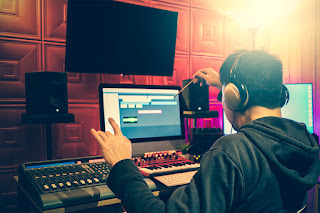5 Home Recording Tips For Beginners
More artists than ever before are finding huge audiences for their music with songs that were recorded from their home studios. Long gone are the days when creating and sharing great music meant having to record at a fancy music studio manned by professional recording engineers. But don’t be fooled. Home recording isn’t easy, and you shouldn’t confuse knowing how to write songs with the ability to record and produce music. Home recording is a skill just like anything else, and it takes time and practice to get better at it. If you’re new to recording from your home studio, here are five tips to help you get started:
Invest in the right equipment
Let’s start with the basics. It’s safe to assume you’re on a limited budget and don’t have tens of thousands of dollars to spend building a home studio. The good news is that you can create great-sounding music from home for a reasonable amount of money with the right equipment and expertise. At the very least, you’re going to need a DAW (Digital Audio Workstation), microphone, headphones, cables, and an audio interface. If you can swing it, it’s well worth the extra money to purchase a preamp alongside these other items. You don’t need the most expensive microphone and preamp to create professional-grade recordings, but you should expect to invest a decent amount of money in these items to get the results you want. Microphones and preamps are especially important when it comes to the sound quality and dynamic range of your home recordings. You can get away with skipping a preamp in your setup, but you’ll hear a big difference if you use one in your recordings.
Use loop settings on your DAW
Whether you’re recording yourself or someone else, the looping setting found in your DAW will be an important tool that you’ll turn to again and again. This feature allows you to select a specific section in your recording that you can record over again and again. Each take is collected without pausing, and this saves you lots of time and stress. You can loop performance takes for an entire song, or for short difficult sections that need special attention. If you’re recording music on your own, the loop recording method will be especially helpful.
Make sure the performances are mastered before you record
Seasoned musicians know the importance of this tip, but it’s worth mentioning for inexperienced musicians. Home recording is going to be way, way harder than it has to be if the performances of the musicians you record aren’t mastered beforehand. Mistakes and flaws are inevitable in music performances, and they can even be seen as unique musical features that define character in a track. But things like forgetting parts, having to stop in the middle of recordings over and over again, and a general lack of confidence in the material will make the home recording process a nightmare. Whether it’s you, someone from your band, or a friend recording in your home studio, make sure performances are nailed down before you begin.
Choose the room wisely, and eliminate unwanted noise
This is an obvious tip, but it’s worth mentioning. Even if you’re going for a lo-fi vibe in your recordings, you’ll want to get rid of non-musical noise as much as possible. Pets, romantic partners, air conditioners and heaters, creaky pipes, and weather are all things that are capable of producing unwelcome noise in your recordings. Your recordings will sound much better if you make the effort to remove and prevent noises like these from the space you’re working in. It’s also worth your time to select the best space in your house, apartment, or dorm for recording and to treat it with foam and acoustic panels if possible. If you’re confined to a tiny dorm room, your options here are probably going to be quite limited, and that’s okay. But if you’re in a house or apartment, choose a space that has the acoustic properties you’re looking for. Big, empty rooms with high ceilings will be ideal for creating natural reverb effects in your tracks, while smaller rooms like closets will be better suited for most other recording needs, like dry vocals.
Take notes
This might be the most important tip on this list. To save time later, make sure you take notes as you record. Instead of trying to remember back to which, takes were the strongest out of the 30 you recorded, marking things down as you go is a better way to go.
We’re living in an incredible age in music where virtually any musician with a computer and some equipment can record and share music that sounds professionally engineered. But this skill won’t be developed overnight.




Comments
Post a Comment